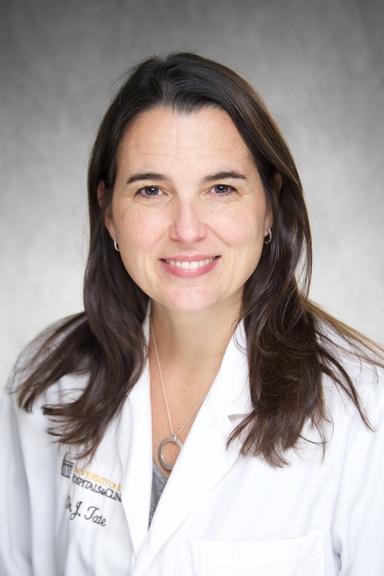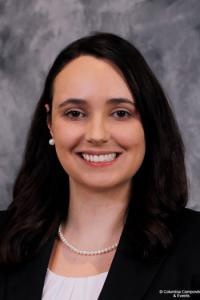Iowa is facing a critical shortage of mental health care providers in rural communities. As of fall 2022, 66% of the state’s psychiatrists worked in Johnson, Linn, or Polk counties—three of the most populous areas in the state— and 73 Iowa counties had no practicing psychiatrist at all.

Iowa House File 2578, passed in 2022, aimed in part to address this growing need. The bill appropriated new funds for rural and public mental health care training, and among the provisions was a new requirement for University of Iowa Carver College of Medicine resident physicians in psychiatry to spend time at one of five state facilities in need of professional mental health services: the Iowa Medical and Classification Center in Coralville, the State Training School in Eldora, the State Resource Center in Woodward, and the Mental Health Institutes in Independence and Cherokee.
Through collaboration with these locations, new rotations were created within the UI Department of Psychiatry residency training program and set to begin in July 2023.
The new training rotations are designed to support institutions across the state that most need psychiatric care providers, says Jodi Tate, MD, clinical professor of psychiatry and vice chair for education in the University of Iowa Department of Psychiatry.
"We want residents to get experience working with underserved populations in rural and public settings,” Tate says. “We hope that exposure to these new clinical sites will spark a resident's interest in serving these communities after they complete their residency."
Valuable lessons from serving incarcerated patients
Katie Meidl, MD, is a resident psychiatrist and chief resident of the psychiatry residency program. Growing up in rural northern Missouri, both her parents were practicing physicians, and she witnessed firsthand the critical shortage of psychiatric care in some of these communities.
“I saw the impact that it had when people were able to get mental health care resources, and I saw the impact when they weren’t able to,” Meidl says. “That set me on the path.”

Meidl was part of one of the first few psychiatric rotations to the Iowa Medical and Classification Center (IMCC), a correctional facility that serves as a processing center for Iowans entering incarceration. The facility provides inpatient psychiatric care to these individuals, among other professional health services. Meidl’s IMCC psychiatry rotation involved working closely with the facility’s team of care providers to perform psychiatric consultations for patients.
“I’ve also had opportunities to work with patients in the forensic hospital at IMCC who are restoring competency to stand trial,” she says. “These are individuals working on getting their mental health better so they can actively participate in the legal process.”
Meidl wants to pursue rural psychiatry, and she has a keen interest in providing care for underserved populations. The IMCC rotation has helped her learn more about how incarceration intersects with the lives and mental health of individuals, families, and communities.
“In community psychiatry, we commonly see patients who have had to address a probationary charge, had a family member in prison, or are trying to rebuild their lives after leaving prison themselves,” Meidl says. “Knowing what resources are available can help you better understand where a patient may be coming from and provide the best care possible.”
She found it rewarding to help patients form a plan to get through a difficult chapter of their lives—but some of the most valuable lessons she learned are practical ones, like learning how charges are processed from the first-hand stories of individuals on parole and probation.
“Meeting the people who work with patients at IMCC—and seeing how they help patients not only get through their time at IMCC but also prepare for leaving IMCC—has been so educational,” Meidl says.
She plans to practice in an outpatient setting in a rural community, and the lessons she learned through her rotation have piqued her interest in collaborating with institutions like IMCC in her future practice.
“I’m learning more about correctional bridge programs that assist patients as they’re leaving prison, and I would be interested in potentially working in that environment in the future,” Meidl says. “Though I may not work in a prison directly, I certainly will work with patients who have been impacted by the prison system.”
Meeting youth mental health needs through telemedicine

Psychiatry resident Marisa Ascencio, MD, is a first-generation college student from Oswego, Illinois. Originally her heart was set on becoming a pediatrician, but she decided to change her mind during her last rotation of medical school.
“I think what made me fall in love with psychiatry was the ability to learn deeply about people and how their background, values, and beliefs impact who they are," she says.
That curiosity about how we become who we are led Ascencio to a career in child psychiatry—and to the new rotation with the State Training School (STS) in Eldora, Iowa. STS is a rehabilitation center for adolescent offenders that aims to support the students’ growth on social, emotional, and societal levels as well as their academic success.
“It’s really treating the whole person versus just treating the mental illness,” Ascencio says. “I’ve never seen a program that’s so robust. It addresses multiple aspects of someone’s wellbeing, which is what I really enjoy.”
Every Monday afternoon, Ascencio visits with adolescents at STS via regularly scheduled telehealth appointments. The rotation takes place over an entire year, which has allowed Ascencio to develop a deeper rapport than is typically possible in a single rotation.
“A lot of the students we see have had a challenging upbringing, and that impacts their mental health, which may impact their school performance and relationships with others” she says. “Our goal is to improve their mental health and set them up for success as adults. I’ve gotten to know these adolescents over the course of a year, and it’s been really rewarding to watch them progress through the program.”
University of Iowa faculty psychiatrist Amanda Elliot, DO, is seated right beside Ascencio during these appointments to provide guidance as needed.
“Dr. Elliot is watching me interview all of these patients live, and so she's able to provide feedback both in the moment and outside of the room,” Ascencio says. “It's the best rotation that I've done during residency because I've been able to really hone my interviewing skills."
Ascencio will begin fellowship training in child and adolescent psychiatry at the Ann & Robert H. Lurie Children’s Hospital this summer. She plans to make telehealth a significant part of her future practice, as her experience with STS has made her believe that telehealth can help us address critical gaps in rural mental health care access.
“Going into child psychiatry, I know how important development and upbringing is to a successful future, but I was really able to appreciate that in a setting like this,” she says. “It’s really challenged me, and I think that will set me up significantly in my future.”